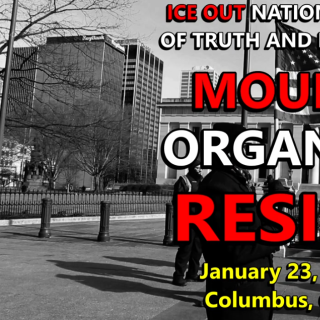As Wendy’s greenhouse defense crumbles, allies look to hold company accountable at tomorrow’s annual shareholder meeting…
Rabbi Rachel Kahn-Troster to Wendy’s: “Given the life-or-death stakes of unsafe working conditions under COVID-19, how can Wendy’s justify its continued failure to join the Fair Food Program?”
Last week, we posted a reflection on the news of a massive COVID-19 outbreak at a greenhouse in upstate New York owned by Mastronardi Produce, one of the largest greenhouse growers in North America and, according to an article from 2019, a supplier to Wendy’s. The overcrowded housing conditions – with workers staying in budget hotels “where they lived four to a room and slept two to a bed” – were the perfect Petri dish for the rapid spread of the novel coronavirus. The outbreak was so severe that it is even being blamed for the death of the husband of one of the hotel employees who cleaned the farmworkers’ rooms and contracted the virus as a result.
Here’s an excerpt from last week’s reflection:
The outbreak in upstate New York illustrates the urgent need for companies like Wendy’s to use their purchasing power to demand compliance with worker health and safety standards from their produce suppliers, and to monitor that compliance just as vigorously as they do food safety standards. Sadly, the substandard living conditions found in the hotels housing Green Empire Farm’s workers — conditions that served as a superconductor to spread the virus among nearly the entire workforce there — remain commonplace on far too many farms that operate beyond the reach of the Fair Food Program. But conditions like those described in New York State were addressed long ago on participating farms in the Fair Food Program. And even during the pandemic, FFP growers have continued to comply with the day-to-day health and safety requirements of the Fair Food Code of Conduct, while also going above and beyond those requirements to implement and share best practices for the prevention of the spread of coronavirus. And the Fair Food Standards Council’s 24/7 complaint line has remained open, giving workers a voice on a wide range of concerns, from access to medical treatment to eligibility for economic relief.
Farmworkers who have worked on both FFP farms and outside the program describe the difference as “night and day.” In normal times, that difference is an outrage that demands remedy; during a pandemic, it could be the difference between life and death. Simply put, Wendy’s can no longer afford to turn its back on the most respected human rights program in the US agricultural industry, because the stakes today are just too high.
The coronavirus poses a dangerous threat to all essential workers, that is true. But it is equally true that workers under the Fair Food Program are empowered — by the purchasing power of the leading food brands participating in the program — to be frontline monitors of their own rights, from the right to work free from sexual harassment to the right to indispensable health and safety standards. That fact puts Fair Food Program workers in an infinitely stronger position to advocate for better healthcare protections than farmworkers who toil without those critical protections.
Today, Wendy’s will be holding its annual shareholders’ meeting, though this year’s meeting will be held online due to the coronavirus pandemic. Despite the change in venue, however, Campaign for Fair Food allies are still planning to press the case for the hamburger giant to end its resistance to real, worker-driven social responsibility and join the Fair Food Program. In keeping with the virtual format this year, shareholders are being asked to submit their questions though email ahead of the meeting, and Wendy’s executives will choose which questions to answer during the live, online event.
One longtime CIW ally, and Deputy Director of T’ruah: The Rabbinic Call for Human Rights, Rabbi Rachel Kahn-Troster, submitted a question for consideration and shared that question with us:
As one of CIW’s co-founders warned in the New York Times on April 3, “America’s 2.5 million farmworkers are among the groups most at risk of contracting the coronavirus. And if they are at risk, our food supply may be too.” That tragic prediction is now coming true. As you may have heard, the largest coronavirus outbreak in Upstate New York was at Green Empire Farm, a greenhouse owned by Mastronardi Produce. According to press reports, workers at that greenhouse were brought in by a third-party farm labor contractor and housed in overcrowded substandard conditions. Press reports from 2019 also indicate that Wendy’s is a customer of Mastronardi Produce.
Has Wendy’s purchased tomatoes from Green Empire Farm, and, if so, how did the unconscionable conditions at Green Empire Farm escape Wendy’s compliance monitoring program? Regardless, given the life-or-death stakes of unsafe working conditions under COVID-19, how can Wendy’s justify its continued failure to join the Fair Food Program, the gold standard for human rights monitoring in agricultural supply chains, which bars farm labor contractors like the one used by Mastronardi and so would provide Wendy’s far better risk mitigation than your current monitoring program?
It will be interesting to see if Wendy’s executives choose to answer Rabbi Kahn-Troster’s question, and if they do, exactly how they choose to answer...
Read more about today's Wendy's shareholder meeting over at the CIW website!
Coalition of Immokalee Workers: (239) 657 8311 | workers@ciw-online.org | www.ciw-online.org



